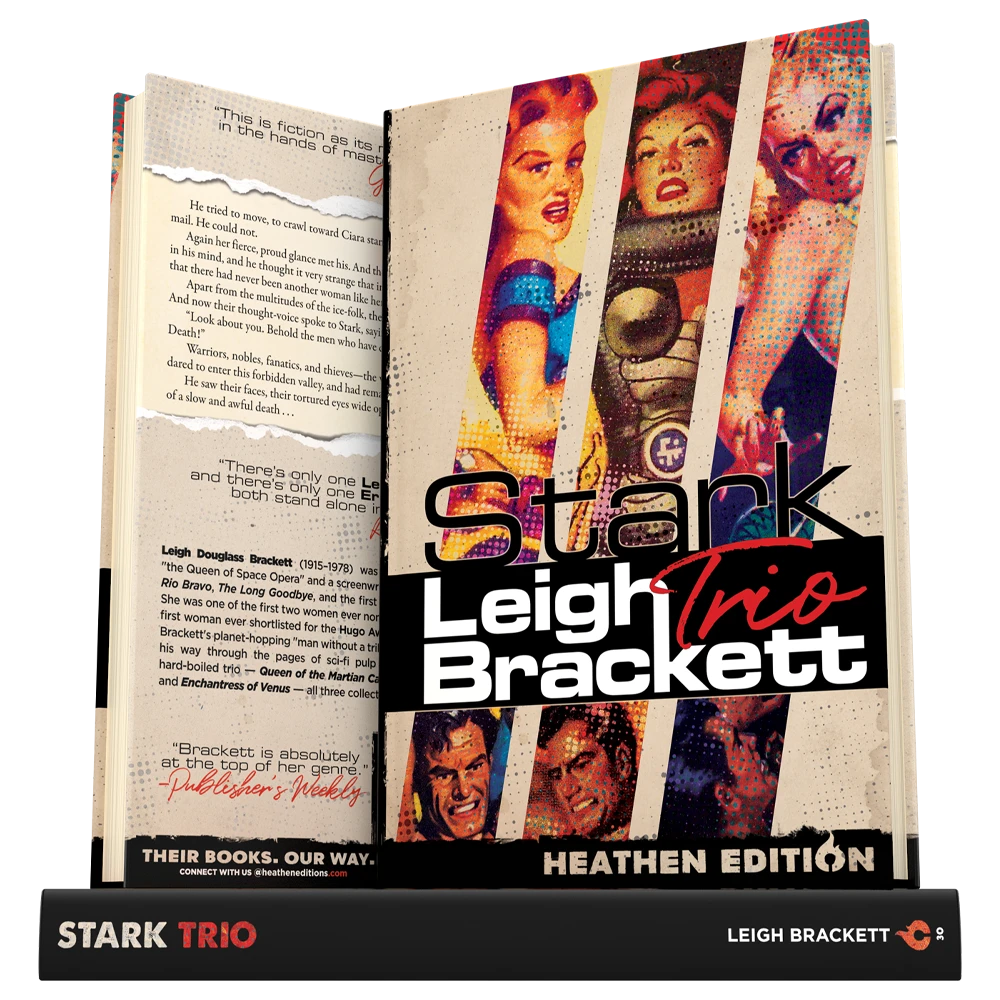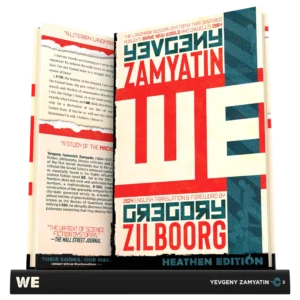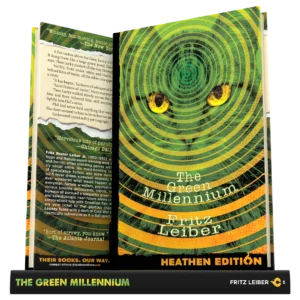No products in the cart.

Stark Trio
Spine #30
Author
Leigh Brackett
Translator
First Edition
1949
Heathen Edition
August 8, 2024
Refreshed
Pages
268
Heathen Genera
Hi-Sci-Fi
Paperback ISBN
978-1-948316-30-9
Hardcover ISBN
978-1-963228-30-4
He tried to move, to crawl toward Ciara standing like a carven image in her black mail. He could not.
Again her fierce, proud glance met his. And the silent laughter of the ice-folk echoed in his mind, and he thought it very strange that in this moment, now, he should realize that there had never been another woman like her on all of the worlds of the Sun.
Apart from the multitudes of the ice-folk, the group of seven stood upon the ledge. And now their thought-voice spoke to Stark, saying,
"Look about you. Behold the men who have come before you through the Gates of Death!"
Warriors, nobles, fanatics, and thieves—the wanderers of a million years who had dared to enter this forbidden valley, and had remained forever.
He saw their faces, their tortured eyes wide open, their features frozen in the agony of a slow and awful death . . .
Leigh Douglass Brackett (1915–1978) was an American author hailed as “the Queen of Space Opera” and a screenwriter best known for The Big Sleep, Rio Bravo, The Long Goodbye, and the first draft of The Empire Strikes Back. She was one of the first two women ever nominated for a Hugo Award and the first woman ever shortlisted for the Hugo Award for Best Novel. Around 1950, Brackett’s planet-hopping “man without a tribe” Eric John Stark bare-knuckled his way through the pages of sci-fi pulp Planet Stories in a razor-sharp, hardboiled trio — Queen of the Martian Catacombs, Black Amazon of Mars, and Enchantress of Venus – all three collected here as first published.
Test Your Might
Paperback
OTHER RETAILERS
Rate & Shelve It
Hardcover
Rate & Shelve It
"There's only one Leigh Brackett and there's only one Eric John Stark — both stand alone in their field!"
Ray Bradbury
Heathenry
Contents
Praise
Details
Heathenry
Brackett has been called “the Queen of Space Opera” and it seemed preordained, “At the age of eight I was a great reader . . . I got hold of a copy of Edgar Rice Burroughs’ The Gods of Mars [1913] and I was never the same after that. Suddenly, I became aware of other worlds out there and then, from that time on, I was destined to be a science fiction writer.”
Finding inspiration in Burroughs’ Mars adventures, Brackett introduced her own planet-hopping “man without a tribe” Eric John Stark in the Summer 1949 edition of sci-fi pulp Planet Stories with the razor-sharp “Queen of the Martian Catacombs.”
His next appearance occurred in the very next issue, for Fall 1949, with “Enchantress of Venus,” which we Heathens believe is certainly the greatest bare-knuckled romp of the trilogy.
Two years later, after Planet Stories had evolved from quarterly to monthly, his third appearance was in “Black Amazon of Mars” for the March 1951 issue. And while that story arrived last in publishing order, it is actually second in chronological order, which is how we have presented it here, in our Edition.
Brackett later expanded two of those stories into short novels: “Queen of the Martian Catacombs” as The Secret of Sinharat and “Black Amazon of Mars” as People of the Talisman, both first published in a 1964 Ace Double paperback, then again in 1982 as Eric John Stark: Outlaw of Mars.
However, those expanded novels have inconsistencies when compared with the originals as first published in Planet Stories, which is why we have collected and presented the originals here.
As for the text, little editing Heathening has been required on our part as we’ve mostly, only jettisoned Brackett’s use of British spellings in favor of their American counterparts.
The bulk of our work lies in the over 100 footnotes we’ve added to provide clarity, context, and commentary as necessary, especially of the literary and archaic words Brackett peppered throughout the stories.
Finally, if this is your first foray into reading the words of Leigh Brackett, then prepare to fall in love . . .
Contents
Heathenry: Thoughts on the Text
Introducing the Author: Leigh Brackett
Queen of the Martian Catacombs
Black Amazon of Mars
Enchantress of Venus
Introducing the Author: Leigh Brackett
Queen of the Martian Catacombs
Black Amazon of Mars
Enchantress of Venus
Praise
“There’s only one Leigh Brackett and there’s only one Eric John Stark — both stand alone in their field!” —Ray Bradbury
“Leigh took science fiction and lifted it above the genre preconceptions. This is fiction as its most exciting, in the hands of master storyteller.” —George Lucas
“Brackett is absolutely at the top of her genre.” —Publisher’s Weekly
“Leigh Brackett combines the best of A. Merritt and Edgar Rice Burroughs with much that is uniquely her own!” —Lester Del Rey
“Miss Brackett’s . . . books have been sheer romantic space operas (which no one does better).” —H. H. Holmes, New York Herald-Tribune
“I believe that Enchantress of Venus is one of the best of the Stark stories . . . the scenes in the strange depths of the gaseous Red Sea lead inexorably toward a final struggle — and a final failure. And indeed, this is a favorite and recurring theme of the Leigh Brackett stories — the theme of a strong man’s quest for a dream and of his final failure when it turns to smoke and ashes in his hands.” —Edmond Hamilton, The Best of Leigh Brackett
“Brackett not only continued the great romantic tradition of Edgar Rice Burroughs (though with infinitely more sophistication), but she managed to sneak into the Puritan pulps . . . a sensuousness which the male writers of the period couldn’t seem to achieve, both in descriptive ability and hints that the hero and heroine wanted more than for the former to save the latter from a bug-eyed monster . . . Brackett’s works are adventurous world-creating at its best.” —A Reader’s Guide to Science Fiction
“She approached all she wrote with economy and vigor: everything about her early stories — their color, their narrative speed, the brooding forthrightness of their protagonists — made them an ideal and fertile blend of traditional space opera and sword and sorcery.” —The Encyclopedia of Science Fiction
Details
Stark Trio
Heathen Edition #30Published: August 8, 2024
Format: Paperback
Interior: Black & White on Cream Paper
Pages: 268 (+2 POD)
Language: English
Annotations: 123 Footnotes
Illustrations: 4
The Heathen Newsletter
Want to be kept in the loop about new Heathen Editions, receive discounts and random cat photos, and unwillingly partake in other tomfoolery? Subscribe to our newsletter! We promise we won’t harass you – much. Also, we require your first name so that we can personalize your emails. ❤️
@heatheneditions #heathenedition
Copyright © 2026 Heathen Creative, LLC. All rights reserved.




